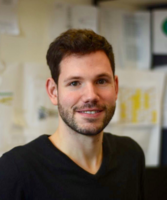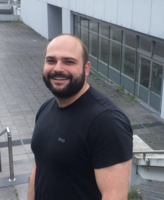What makes me a successful researcher? This is probably a question every PhD student, who plans a professional career in academia, has to face. It’s a question that opens up many more ones, such as how important are softskills and networking, or how difficult is to receive third-party funding. Tips and answers can be found online or at courses, but we decided to ask for firsthand experience and to interview someone who has been very successful recently, Nicolas Plumeré: In 2016 Plumeré received an ERC Starting Grant, in 2017 he was appointed full professor at the faculty of chemistry and biochemistry at RUB, and in February 2018 the ERC funded LiveSEN, his Proof of Concept project on a nitrate sensor for agricultural use. Plumeré is also member of RESOLV.
What triggered your interest in science?
It was back in my bachelor studies. During an internship, my professor in electrochemistry said “this is what we can do with electrochemistry, but to be able to do it, we must understand it first!” It was one of those life changing experiences! Electrochemistry became the real core of my interest. Even though it was somehow underrepresented at that time, it was already clear that electrochemistry was linked to renewable energy, sustainable use of resources, or precision agriculture. When you are young, you are idealist and I wanted to give my contribution to society.
Could you briefly describe your career path as a professional scientist?
My academic career can been described as atypical. I was driven by applications contributing to real life, therefore I decided to go into industry right after my bachelor’s degree - in France this is not unusual. I spent 3 years in a startup specialized in tools to help farmers get better yields with less environmental impact - a field called precision agriculture. Unfortunately, the industry is looking for results in the short term, so you cannot dive very deep into new ideas. Therefore I decided to go back to university and get a master’s degree in chemistry. Afterwards I followed a rather classic path: PhD, short postdoc in industry followed by a position as group leader and finally professor at RUB.
Could you elaborate on your stays abroad? Is it necessary to have international experience?
I have never been thinking about going to a specific country, instead I was searching for projects fitting to my interest. That interest brought me from France, to Scotland, Germany, USA and back to Germany. Collecting experiences in different groups is how you find your own way in science. It has not to be necessarily the US, but if you look at the recruitment committees, they are usually ticking boxes and one of them is "stay abroad". Moreover, it helps you to develop as a person, you are away from family and friends, so you have to get out of your comfort zone.
What do you think about the German academic system?
As said, I have no preference for a country or city. But Germany is really attractive. First, there is a lot of funding for early career researchers compared to other countries – France for example. Second, there´s the high quality of the universities and the concept that almost every chemistry student is doing a PhD. The PhD time is really important, because it´s when you really start learning to think and plan by yourself. Those problem solving skills are what you actually need in the industry as well.
You recently got an ERC starting grant. How did you do it? And how important is the factor luck?
Clearly, luck will always be a parameter. But in the case of third party funding like the ERC, you can be less dependent on it by learning how to write and to present a good story. Of course the quality of your papers and ideas matters, but if you cannot explain why your story is exciting, you will miss the opportunity. Outside the proposal process, you can increase your success chances by making yourself visible. Go to conferences, give talks, share your ideas: It really comes down to your scientific network and visibility.
How do you deal with setbacks?
Manuscript rejection, proposal rejections, students who are not living up to your expectations, these kinds of setbacks are your bread and butter in academia. So you have to learn from your failures to overcome them. For example, improving amanuscript is straightforward, the editor’s and reviewer’s critiques are usually clear and direct. Learn from them and write the next one or do the revision accordingly. Learning from failed proposal is more difficult. Often you have rejection letters that are without any useful explanations. Sometimes I could find out because I met one of the reviewers that spontaneously told me about the real weaknesses of the proposal or of the consortium - so again the keywords are visibility and networking. Finally, with the students you have to adapt to their objectives, arrange the project accordingly and not be disappointed. In the end we chose each other, therefore we have to make the best out of it for both sides.
How important are structures like RESOLV for young scientists?
Really important. Large cooperative projects like RESOLV forces you to think outside the box -outside your own box-, to learn from others expertise, to work together, that's really the difference compared to classic single group publication projects. In my group for example we work on the integration of enzymes in hydrogels and we could have done some research without the context of solvation, but because of RESOLV we could bring the quality and understanding of our projects to a much greater level. This is what makes our project unique in this very field of research. And you do not only benefit from the expertise, you also benefit from the visibility of the cluster. It will help you a lot if you are very close in your cooperation with someone very established.
How do you combine work and family?
This is the big negative point. It is really difficult when it comes to combining work and family because you will have a 40 hour contract, but I do not know how you can teach, publish, attend conferences, administer projects, and supervise students in just 40 hours. It just doesn´t fit in.
In hindsight, would you do something differently, if possible?
I do not regret any places that I have been, because I have learned a lot there. But I was never associated to a famous Principle Investigator, or a renowned university, say Stanford. While it still worked out for me, do not take me as an example to follow. Find a famous mentor, a top university. It adds a lot to your CV.
Could you give an advice to someone who is at the beginning of his or her PhD?
Whether youwant to go into industry or follow an academic career, you should try to get excellent results, publish, do internships abroad, and start build up your own network. But if you aim for an academic path you really have to find your own topic. Academia should neither be about making a big career, nor about the money. It should really be about your passion. Take the opportunity of the PhD time to figure out, what it is that drives and satisfies you.
————————————————————————————————————————————
About the authors



